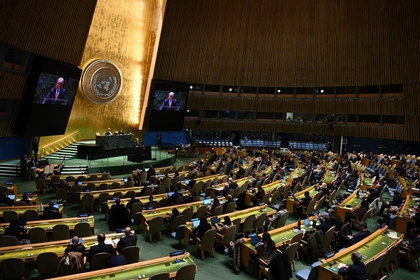The EU is planning to task Denmark with inspecting and if necessary, blocking, Russian oil tankers from sailing through its territorial waters, the Financial Times reported, citing three unidentified sources.
Moscow has largely been able to bypass the effects of a December 2022 price cap on oil and use oil revenues as a key source of income for its invasion of Ukraine – but the EU hopes the new measures would be more effective in keeping Russian oil at the $60 per barrel imposed by the G7.
JOIN US ON TELEGRAM
Follow our coverage of the war on the @Kyivpost_official.
What the EU plans
Under the plan, Denmark would check tankers transiting the Danish straits – roughly 60 percent of Russia’s total seaborne oil exports – for Western insurance, three people with knowledge of talks in Brussels told the newspaper.
By falsifying documents, Russia’s shadow fleet of tankers have been able to bypass the price cap that was imposed by the G7 as a result of Russia’s 2022 Ukraine invasion.
However, Western insurance companies refuse to provide insurance to ships that fail to comply with G7 price caps. And since the Russian tankers bypassing the price cap don’t have the Western insurance, the EU would have grounds to inspect them.
According to the UN Convention on the Law of the Sea, states are allowed to inspect and institute proceedings – including detention of a vessel – in cases where there is “clear objective evidence” that a vessel poses a major threat to the environment.

US Urges Backing of ‘Simple’ UN Resolution as Trump Calls for Putin-Zelensky Talks
And the demand that ships be properly insured is justified beyond the desire to impose a price cap the Financial Times’ sources said – since many Russian oil shipments are being carried by older vessels with a higher chance of breakdown or spillage, and which could, quite realistically, create major environmental disasters.
On the other hand, officials said that the proposal relies on the capacity of Danish naval authorities to stop and inspect tankers.
So, the next question is, what should be done if a ship refuses to stop?
“Discussions appear to be centered on making life more complicated for Russia and the buyers of its oil,” said Henning Gloystein of the Eurasia Group consulting firm. “If you can make the bureaucracy and risk associated with trading Russian oil a lot more onerous, the expectation is buyers will start to demand larger discounts again for their trouble.”
Why additional measures on Russian oil are necessary
The volume of Russian oil transiting Danish waters every day is the equivalent to about 2 million barrels of crude, or three Aframax vessels – a common ship used for Russian exports.
The Danish government has not commented on the article. The European Commission has said that its President, Ursula von der Leyen, has promised to adopt further “actions to tighten the oil price cap.”
The EU is considering other restrictions as part of its 12th package of sanctions, which member states are to discuss this week. They include measures against shipping companies that sell their old ships to Russia’s “shadow fleet,” as well as against countries that allow these ships to sail under their national flags.
Russia’s reaction
On Wednesday, Kemlin spokesman Dmitry Peskov told reporters that he hadn’t received any news about the potential EU move, Reuters reported.
When asked if the Russian navy would escort tankers with Russian oil passing through the Baltic Sea if Denmark moved ahead with inspections, Peskov replied that the Kremlin did not make such grave decisions based on news reports.
Peskov did say that the rules of international shipping must be observed.
You can also highlight the text and press Ctrl + Enter











